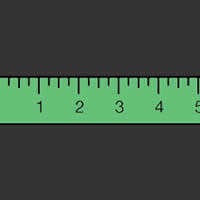
SI Standard Metric Units
Metric unit abbreviations of length are defined by standard SI prefixes and the abreviation for the base unit of length in the SI system, the metre, m. For example 1,000 metres is 1 kilometre, which is written as 1km in abbreviated form. It is unusual for metric units to have non-standard abbreviations. Where there is a non-standard abbreviation it is often from an obsolete name for the unit.
The word metre is spelt in two different ways. Users of American English use the spelling 'meter', whereas others use 'metre' from the original French spelling.
Yoctometre
SI Abbreviation: ym
Zeptometre
SI Abbreviation: zm
Attometre
SI Abbreviation: am
Femtometre
SI Abbreviation: fm
Picometre
SI Abbreviation: pm
The picometre was also called the micromicron (Abbreviation: μμ) prior to standardisation on the term picometre.
Nanometre
SI Abbreviation: nm
The nanometre was also called the millimicron (Abbreviation: mμ) prior to standardisation on the term nanometre.
Micrometre
SI Abbreviation: μm
The micrometre is often referred to as a micron with abbreviation μ.
Millimetre
SI Abbreviation: mm
Centimetre
SI Abbreviation: cm
Decimetre
SI Abbreviation: dm
Metre
SI Abbreviation: m
Decametre
SI Abbreviation: dam
Hectometre
SI Abbreviation: hm
Kilometre
SI Abbreviation: km
The kilometre is sometimes abbreviated to klick in military use (especially when spoken)
Megametre
SI Abbreviation: Mm
Gigametre
SI Abbreviation: Gm
Terametre
SI Abbreviation: Tm
Petametre
SI Abbreviation: Pm
Exametre
SI Abbreviation: Em
Zettametre
SI Abbreviation: Zm
Yottametre
SI Abbreviation: Ym
Other Metric Units
Myriametre
Abbreviation: mym
The myriametre is an obsolete metric length unit equavalent to 10,000 metres.
Imperial & US Customary Length Units
There are many Imperial length units, most of which are obsolete in the modern world. Those that are in use often have more abbreviations than their metric counterparts. This is sometimes due to historical changes but in most part due to attempts to disambiguate the abbreviations from metric abbreviations. For example the abbreviation for the mile was formerly m, but this abbreviation is in use for the metre so the mdern standard abbreviation for the mile is mi.
Imperial length units can be split into two sections land units and nautical units.
Length Units (Land)
This section covers common units, such as miles, yards, feet and inches, and many less common units.
Thou
Abbreviation: th
Also known as the thousandth (as it is one thousandth of an inch) or sometimes in the USA as the mil. Plurals are thousandths and mils respectively.
inch
Abbreviation: in
The double quote symbol " is used to indicate inches. e.g. 3" for three inches.
Foot
Abbreviation: ft
The single quote symbol ' is used to indicate feet. e.g 5' for five feet.
Yard
Abbreviation: yd
Rod
Abbreviation: unknown
The rod is a unit of length also known as the pole or perch (neither of which appear to have abbreviations either).
Link
Abbreviation: unknown
Chain
Abbreviation: ch
Furlong
Abbreviation: fu
Commonly used for lengths of horse races, this unit is often abbreviated as just f.
Mile
Abbreviation: mi
Commonly abbreviated as m. This abbreviation is being discouraged as it is the abbreviation for the metre.
League
Abbreviation: lea
Length Units (Nautical)
This section covers Nautical miles, fathoms and other units that are used at sea.
Fathom
Abbreviation: ftm
Shackle
Abbreviation: unknown
Cable
Abbreviation: unknown
Nautical Mile
Abbreviation: M
The standard abbreviation for the nautical mile M, is very rarely used with NM being preferred by the International Civil Aviation Organisation. The IEEE prefers nmi and nm is often used in naval applications (this abbreviation is also used as the abbreviation for the nanometre).